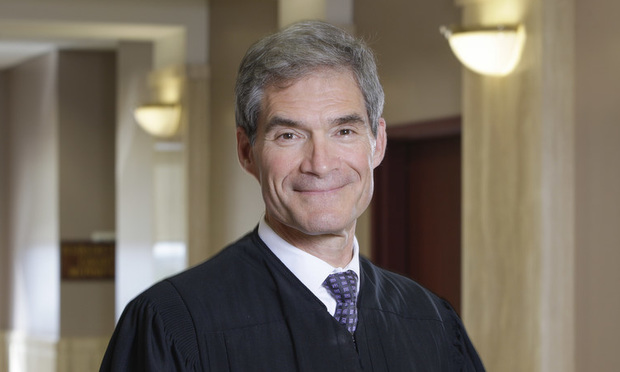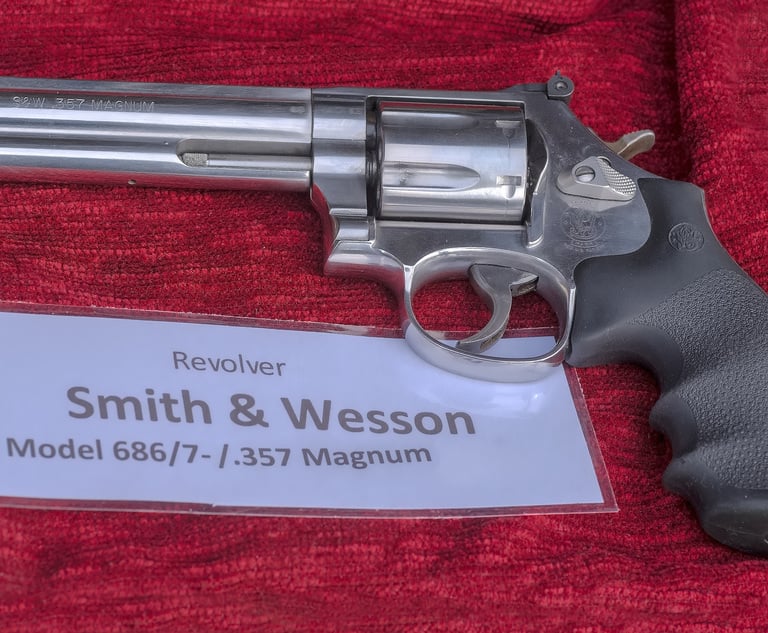SCOTUS Ruling in 'Lexmark' Won't Help Downstream Seller of Industrial Machinery in Trademark Case
Gray-market equipment reseller Radwell International seeks a "death knell" for the material differences doctrine, based on the U.S. Supreme Court's "Lexmark" ruling, but the court said material differences jurisprudence remains alive and well after "Lexmark."
December 31, 2019 at 02:30 PM
4 minute read
 U.S. District Judge Robert Kugler/photo by Carmen Natale
U.S. District Judge Robert Kugler/photo by Carmen Natale
A federal judge in Camden has denied a motion for partial summary judgment in Rockwell Automation's trademark infringement suit against a gray-market reseller of the company's industrial automation products.
Radwell International moved to dismiss Rockwell's trademark claims based on a 2017 U.S. Supreme Court ruling, Impression Products v. Lexmark International. But U.S. District Judge Robert Kugler denied the motion to dismiss, rejecting Radwell's theory about the Lexmark case's impact on the sale of goods through unofficial channels.
Rockwell's suit targets the sale of its products by Radwell, claiming that the sale of those products without Rockwell's warranty, quality control and customer support is confusing to the public and thereby infringes on its trademarks. Rockwell sells its products only through a chain of authorized distributors who agree not to sell those items to nonvalue-added resellers.
Radwell, based in Willingboro, argues that the Lexmark decision held that Rockwell's intellectual property rights were exhausted on the first sale of the goods in question. Radwell further contended that Lexmark abolished the doctrine that the sale of gray goods, even if materially different from goods authorized for sale in the U.S., necessarily creates confusion as to the source of those goods. And Radwell also claimed that a 2013 U.S. Supreme Court case, Kirtsaeng v. John Wiley & Sons, which involves the sale of copyrighted gray goods, supports its interpretation.
Kugler said the U.S. Court of Appeals for the Third Circuit has not decided whether the Supreme Court's holdings in Lexmark and Kirtsaeng did away with the material differences doctrine for trademarks. But he cited a 1998 case, Iberia Foods v. Romeo, which he said was "the Third Circuit's defining case on the exception to the first sale doctrine" because of "material differences" of unauthorized gray goods.
In Iberia Foods, the U.S. distributor of a cleaning product called Mistolin brought suit against a seller of a gray market version of the product that was purchased in Puerto Rico and distributed in the U.S. The District Court granted summary judgment to the gray market distributor, finding that its products were not genuine, because they never passed through Iberia's quality controls. The Third Circuit reversed, finding the gray market products did not materially differ from Iberia's.
Kugler said such quality control procedures may create subtle differences that are difficult to measure. The test for whether such procedures create material differences is whether those differences create consumer confusion about the product's origin that could injure the trademark owner's goodwill.
Kugler also cited a September 2019 case from the Eastern District of New York, Abbott Laboratories v. Adelphia Supply USA, which held that the Lexmark case did not disrupt the material differences doctrine. In Abbott, a maker of glucose strips used by diabetics to monitor their blood sugar brought suit against a company that bought lower-priced versions of those strips overseas and resold them in the U.S.
The Abbott court said it was "not persuaded that the principles enunciated in Kirtsaeng and Lexmark disturb this Circuit's law on trademark infringement with respect to gray goods."
"Because of the thorough-going reviews of the 'material differences' exception to the first sale doctrine in Iberia and Abbott and given that neither Lexmark nor Kirtsaeng raised or had reason to even consider the 'material exception' doctrine as applied to trademarks, this Court relies on Third Circuit reasoning in Iberia and on the relevant considerations in Abbott for the continued relevance and applicability of the 'material differences' doctrine to the motion here," Kugler wrote.
Radwell asked for the court to declare a "death knell" to the material differences doctrine, which would be "a new, unprecedented application of the first sale doctrine for gray goods covered by trademarks," Kugler said. But "this court confirms with the Abbott court that the 'material differences' jurisprudence was not disturbed by Lexmark or Kirtsaeng," Kugler said.
Peter Shapiro of Lewis, Brisbois, Bisgaard & Smith in New York, representing Radwell, did not return a reporter's call about the ruling. Jenny Kramer of Alston & Bird in New York, representing Rockwell, also did not return a call.
This content has been archived. It is available through our partners, LexisNexis® and Bloomberg Law.
To view this content, please continue to their sites.
Not a Lexis Subscriber?
Subscribe Now
Not a Bloomberg Law Subscriber?
Subscribe Now
NOT FOR REPRINT
© 2025 ALM Global, LLC, All Rights Reserved. Request academic re-use from www.copyright.com. All other uses, submit a request to [email protected]. For more information visit Asset & Logo Licensing.
You Might Like
View All

Class-Action Suit Filed Against Jaguar for Claims of Defective Windshields in Land Rover Defender

Fortune 500 Company Sues Metals Supplier Alleging It Used Proprietary Info Obtained During Bidding Process to Poach Talent

In Split Ruling, 3rd Circuit Declines to Halt Consumer Fraud Probe of Gunmaker
5 minute readLaw Firms Mentioned
Trending Stories
- 1South Florida Real Estate Lawyers See More Deals Flow, But Concerns Linger
- 2General Counsel Accused of Destroying Evidence
- 32,000 Docket Entries: Complex South Florida Dispute Sets Precedent
- 4Incoming Howard University Law Professor Kiah Duggins Among DC Plane Crash Victims
- 5Bass Berry & Sims Relocates to Nashville Office Designed to Encourage Collaboration, Inclusion
Who Got The Work
J. Brugh Lower of Gibbons has entered an appearance for industrial equipment supplier Devco Corporation in a pending trademark infringement lawsuit. The suit, accusing the defendant of selling knock-off Graco products, was filed Dec. 18 in New Jersey District Court by Rivkin Radler on behalf of Graco Inc. and Graco Minnesota. The case, assigned to U.S. District Judge Zahid N. Quraishi, is 3:24-cv-11294, Graco Inc. et al v. Devco Corporation.
Who Got The Work
Rebecca Maller-Stein and Kent A. Yalowitz of Arnold & Porter Kaye Scholer have entered their appearances for Hanaco Venture Capital and its executives, Lior Prosor and David Frankel, in a pending securities lawsuit. The action, filed on Dec. 24 in New York Southern District Court by Zell, Aron & Co. on behalf of Goldeneye Advisors, accuses the defendants of negligently and fraudulently managing the plaintiff's $1 million investment. The case, assigned to U.S. District Judge Vernon S. Broderick, is 1:24-cv-09918, Goldeneye Advisors, LLC v. Hanaco Venture Capital, Ltd. et al.
Who Got The Work
Attorneys from A&O Shearman has stepped in as defense counsel for Toronto-Dominion Bank and other defendants in a pending securities class action. The suit, filed Dec. 11 in New York Southern District Court by Bleichmar Fonti & Auld, accuses the defendants of concealing the bank's 'pervasive' deficiencies in regards to its compliance with the Bank Secrecy Act and the quality of its anti-money laundering controls. The case, assigned to U.S. District Judge Arun Subramanian, is 1:24-cv-09445, Gonzalez v. The Toronto-Dominion Bank et al.
Who Got The Work
Crown Castle International, a Pennsylvania company providing shared communications infrastructure, has turned to Luke D. Wolf of Gordon Rees Scully Mansukhani to fend off a pending breach-of-contract lawsuit. The court action, filed Nov. 25 in Michigan Eastern District Court by Hooper Hathaway PC on behalf of The Town Residences LLC, accuses Crown Castle of failing to transfer approximately $30,000 in utility payments from T-Mobile in breach of a roof-top lease and assignment agreement. The case, assigned to U.S. District Judge Susan K. Declercq, is 2:24-cv-13131, The Town Residences LLC v. T-Mobile US, Inc. et al.
Who Got The Work
Wilfred P. Coronato and Daniel M. Schwartz of McCarter & English have stepped in as defense counsel to Electrolux Home Products Inc. in a pending product liability lawsuit. The court action, filed Nov. 26 in New York Eastern District Court by Poulos Lopiccolo PC and Nagel Rice LLP on behalf of David Stern, alleges that the defendant's refrigerators’ drawers and shelving repeatedly break and fall apart within months after purchase. The case, assigned to U.S. District Judge Joan M. Azrack, is 2:24-cv-08204, Stern v. Electrolux Home Products, Inc.
Featured Firms
Law Offices of Gary Martin Hays & Associates, P.C.
(470) 294-1674
Law Offices of Mark E. Salomone
(857) 444-6468
Smith & Hassler
(713) 739-1250






